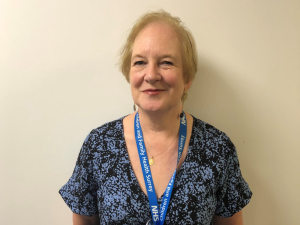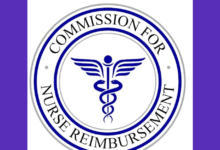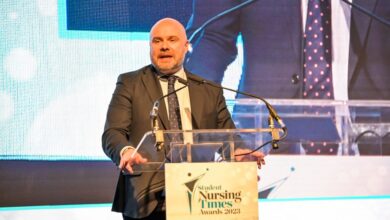How nurse-led community kitchen is helping asylum seekers

Once a month, village and church halls in Surrey open their doors to asylum-seeking families living in hotels.
Tables are laid and decorated with fresh flowers and lit candles, as traditional music from different countries around the world hums in the background.
On these evenings, asylum-seeking families are invited to cook and eat together, and in turn celebrate the rich and varied cultures from their home countries.
All of this has been made possible by the nurse-led inclusion health team at Children and Family Health Surrey, who have been running the community kitchen since 2021.
“We’re hoping that if we can get this model up and running, then it’s something that will be easily transferable anywhere in the country”
Lisa Gavin
The multidisciplinary team of 10, made up of health visitors, community nurses, school nurses, nursery nurses and midwives, have each month volunteered outside of their work hours to bring the kitchen to life.
Clinical service manager of the team, Lisa Gavin, told Nursing Times that the idea for a community kitchen came around when hotels in Surrey first began to open their doors to asylum seekers.
Initially the team at Children and Family Health Surrey took on a small caseload of mothers and babies, but the caseload continued to grow as more people arrived in the hotels.
Ms Gavin explained that the more families she met, the more she realised how much distress they were in and what they had been through.
“These populations of people suffer so much deprivation and they have experienced, or are experiencing, so much trauma, that it’s much more difficult for them to get the sort of help that they need,” she said.
The use of contingency asylum accommodation – most commonly in the form of hotel rooms – has increased in recent years due to insufficient space to house asylum seekers in the UK.
The Refugee Council, a charity, has argued that this is because there has been a lack of flow through the asylum system, meaning people are entering it faster than they are leaving.
According to Home Office statistics, as of 30 June 2023 there were more than 50,000 asylum seekers being housed in hotels in the UK.
“Counter to the popular narrative, all of these people have gone through extraordinary journeys and difficulties [including] rape, torture [and] traumas that are unimaginable,” said Ms Gavin.

Lisa Gavin
She explained that many asylum seekers came with “a lot of unmet health needs” and that it became the priority of the inclusion team to try and promote health advocacy within the spaces that they were inhabiting, which is how the community kitchen came to be.
In 2021, the inclusion team was approached by Surrey County Council, which had made £10,000 available to put towards the wellbeing of asylum seekers in the area.
Ms Gavin said she decided to pitch the idea of funding some sort of communal cooking programme for those living in hotels, as anecdotally she had been hearing that the quality of food they were receiving was poor.
She said the most common evening meal given to residents was “a cheap curry delivered in a takeaway container”. In addition, she warned that it was rare for residents to have snacks throughout the day and, if they did, the food had little nutritional value.
Alarm bells began to sound for the group of public health nurses when they realised the impact that the lack of nutrition was having on children and babies.
Ms Gavin said: “We’ve seen speech delays [and] children [who] can’t chew. Children are going to school and they won’t eat the school food because they’ve never seen food like it.”
Not only are mealtimes lacking nutrition and creativity, they are also lonely for those living in the hotels, explained Ms Gavin.
She described how asylum seekers had been denied opportunities to connect with one another as many of the hotels do not allow eating in communal spaces, resigning people to eating in their rooms.
Wanting to improve mealtimes, the inclusion team surveyed families living in the hotels, to ask them if they would be interested in cooking meals for one another.
She said the team received a unanimous “yes” to the survey, and that families were “queuing up” with offers to cook for their peers.
“There’s something about being able to cook your own food, from your own culture, with your own spices. It’s much, much more than just a health initiative,” said Ms Gavin.
With the support of the voluntary sector, and the facilities offered by local village and church halls, the community kitchen came to life.
Now, there is rotating schedule of people who volunteer to cook for one another.
Using the funding from Surrey Country Council, the inclusion team sources ingredients at request of the residents.
Each person or group cooks for around 30 to 40 people each time. While they cook, the inclusion team decorates the tables with tablecloths, candles and flowers, and encourages residents to play music from their home country.
Ms Gavin explained that the community kitchen was “entirely led by the asylum seekers” and that, as time has gone on, the inclusion team has taken a step back from the process. “It’s about autonomy. It’s about giving people a sense of purpose, respect [and] choice,” said Ms Gavin.
She added: “[Asylum seekers] live in limbo. They don’t know whether they’re going to get a decision or a Home Office letter next week, next month or [in] two years, so they’re trapped in this situation of not being able to make any decisions about their future. And so [the community kitchen] gives them a sense that this is their thing and that they’re in charge.”
Ms Gavin said it was fascinating to observe how residents value one another’s culture, despite the language barriers that may exist.
She added: “This is about community; this is about integration and cohesion. It’s about these people being able to cook for their fellow hotel residents that they see every day and pass in the corridor.”
The inclusion team oversees the community kitchen across two different hotels each month. Any time spent supporting the programme is done completely voluntarily and outside of the nursing team’s working hours.
Ms Gavin said it was not just the asylum seekers who benefit from the opportunity, but that it was raising the profile of the important work that community and public health nursing teams can do.
“Although this work is really hard, we know that we’re making a difference,” she said. “And that’s really powerful as a health practitioner to actually feel like you’re making a difference.
“It’s those face-to-face connections with people that remind us about what’s really important, and about how health is wider than just a health assessment.”
As part of the community kitchen, the inclusion team has supported asylum seekers in obtaining a food hygiene certificate. Ms Gavin said she hoped that this would boost the employability of those who are eventually granted asylum in the UK.
“What we want to do is change the negative narrative about asylum seekers,” she said, adding: “These are people who, as soon as they get their asylum decision, are going to be part of our community. So we should welcome them and celebrate them and think about all the skills that they bring, and also support them in that journey from where they’ve come, to where they would like to be.”
Looking forward, Ms Gavin said the inclusion team was planning to go back to Surrey County Council to request more money to expand the project.
She also noted that primary care colleagues who were responsible for looking after single male asylum seekers in the county were already liaising with the Children and Family Health Surrey team, to see if they can introduce a similar initiative.
“We’re going to attend some clinics and help them set them up for the young men, so it’s wider than just here. We’re hoping that if we can get this model up and running, then it’s something that will be easily transferable anywhere in the country,” said Ms Gavin.
It comes as, in June, the government announced that it intended to move 5,000 asylum seekers to alternative accommodations – including vessels and former military sites – to “slash the number of hotels being used for asylum seekers”.
If these plans are to go ahead, Ms Gavin said the need for some sort of community initiative “will be even greater”. She added: “We know the Home Office is emptying the hotels and looking at other forms of accommodation. So I envisage [the community kitchen] would be transferable. Anybody could do it.”
In the short term, Ms Gavin said the work across Surrey would continue, and that she was looking to bring two more hotels in the area into the fold. In addition, she pledged that, should the inclusion team receive any more money, it would endeavour to host the community kitchen more than once a month.
Ms Gavin said: “I want this to be something sustainable, and not just something that was nice and [then] off we go. I don’t think that’s fair to people.
“This is about working with the community, rather than just looking for a quick fix. We’re increasing their independence in a situation where they have very little independence – and giving them a hope for the future.”







